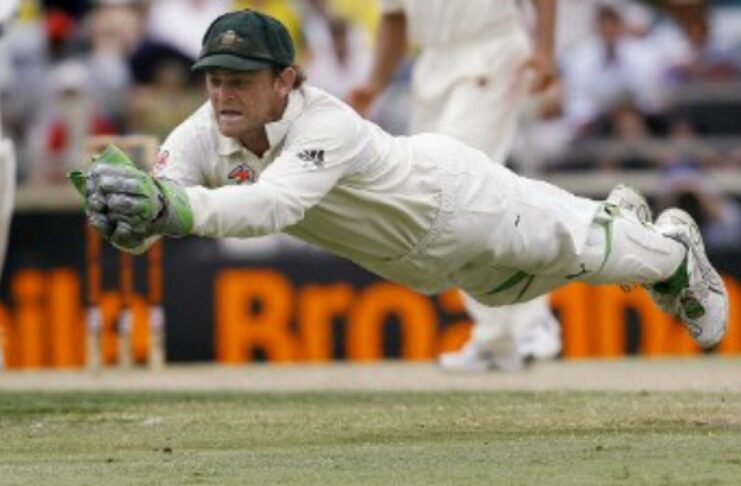In extending a tribute to Adam Gilchrist, one wonders what part of his game should be attributed more reverence: is it unwavering steadfastness of his moral compass, the batsman walking off often even before an umpire would rule him out or is it his contributions toward truly pioneering, an underrated force of the game: the wicket-keeping batsman?
Perhaps it would be incorrect to think that Cricket merely respects the greats of the game or the big achievers. Cricket has always reserved immense appreciation for those who discovered new ways of challenging their opponents.
The West Indians in the sixties and seventies are still revered for demonstrating what is meant by invincibility. You know the names, you hear them all the time: Sobers, Hall, Garner, Holding, Lloyd.
Where does Adam Gilchrist stand among the greats?

You regard Wasim Akram for giving swing-bowling a true definition, in a way, bringing to real time a gifted skill that somewhere seemed imaginary like the stuff one embraces in a Virtual Reality show.
Even as Harold Larwood became the proponent of not the most respected art of fast-bowling- bodyline- he found a band of followers who relive through his explosive battles with Sir Don, cricket from a hitherto less-seen lens.
Kallis is credited for placing the all-round model cricketer on a pedestal that often only accepted batsmen as greats of the game.
In this regard, one ought to extend a tribute to Adam Gilchrist, a man whose feats provided the background music to enable the wicket-keeping batsman hold centre stage in the gentleman’s sport.
What does Adam Gilchrist mean to you?

Was he just another attacking batsman who ended up striking lots of ODI centuries without sacrificing those true attacking instincts from Test cricket? Or was Gilchrist a daring wicketkeeper who made Australia an ever stronger, and hence, scary opponent during the late 90s and 2000s?
For someone who came hard at Tendulkar, going as far as questioning the batsman’s support to Harbhajan in his testimony during the controversial ‘monkey-gate’ scandal, it suffices to say that Gilchrist wasn’t afraid to take on the biggies of the game, even if that meant highlighting his piece of mind off the cricket field.
That Gilchrist’s bat was as clean and straightforward as the fast-talking left-hander was further evidence of the dashing stroke-makers’ uncomplicated way of batting.
To that end, it is worthwhile to mention that Gilchrist’s conduct in the sport- fair, extremely competitive, with weight given to feats with the glove and the bat with zero energies stored for verbatim or sign language or gestures- made him a fierce opponent who didn’t have any interest to spit venom on his opponents.
That he had the company of extremely competitive but aggressive Australians such as Fleming, Warne, McGrath, Slater, Haydos among others made Adam Gilchrist both a cut away from the rest as well as a member of a rare league that were admired for their sober but thoroughly professional conduct.
As a tribute to Adam Gilchrist, it’s essential to highlight his achievements in the Test arena being no different to his style and ferocity in the limited overs game. After all, it seemed, the leftie merely changed jerseys whilst retaining the sense of sameness in his game that defined him as a sportsman.
Those rasp cuts, powerful pulls, well-timed pushes and, luscious hits that travelled the distance seemed to pay a compliment from Gilchrist the batsman to Gilly, the keeper, who was an agile Tarzan behind the wickets, one who often did a Jonty in going airborne, taking blinders at every conceivable angle from behind the stumps.
A fine all-round record

But when you admire Adam Gilchrist, you tend to delve a little deep than merely restricting your focus to him striking nearly 15000 runs, 33 hundreds, and 81 fifties.
You tend to walk the long mile to pay compliment to an exciting athlete who played the game by his own rules without tampering with the spirit of competition.
The Gilchrist who struck a fantastic 81 against a Shoaib, Akram-powered Pakistan to guide his team to a ten-wicket Test win in 1999 was the same man of principle and urgency who walked away in the semis of the 2003 World Cup, knowing well that he’d edged it to Sanga off Aravinda.
That, the man who gave blazing starts to Australia, partnering with everyone, be it, Mark Waugh, Matt Hayden or Langer, was also a bloke of a fiercely independent thinking, who didn’t for a second, choose to discuss with his team, the decision of his retirement, speaks well for a sport that churned characters in an age of theatrics.
Probably, it’s a shame that we didn’t get the pleasure of seeing Adam Gilchrist hoist some lusty blows struck with carnivorous powers in T20s, for his retirement co-existed with the age of T20s birth. But in the same sense, it’s worth savouring the fact that the distinct charms of witnessing an inspiring cricketer, who, till the end, played for upholding Australia’s pride chose to burn out in the classical templet of the sport.
A tribute to Adam Gilchrist

A T20 intrusion may only have heightened the possibilities of energizing headlines chalked in Gilchrist’s feats. His true genius was felt and documented in Test and ODI cricket, after all. Who else but a Gilchrist could’ve plundered Test cricket’s fourth fastest ton, that 2006 hundred against England of 57 deliveries?
For someone who inspired Dhoni, complimented the pantheon of greats who played alongside, struck 6 of his 16 Test hundreds against Lankans, scored over 1600 ODI runs against India, and went on to strike 100 Test sixes, how is it that his name isn’t mentioned on a list of great modern batsmen, an elitist reverence extended merely to a Lara, Kallis, Sachin, Dravid, Younis Khan, and Virat Kohli?
Maybe Adam Gilchrist’s phenomenal feats are worthy of sanctioning perhaps cricket’s most well-known underserved debate; are wicket-keeping batsmen really given the importance they deserve? Or maybe his luminosity was so rare amid the usual star-studded galaxy that we just couldn’t find a way to pay a tribute to Adam Gilchrist?

